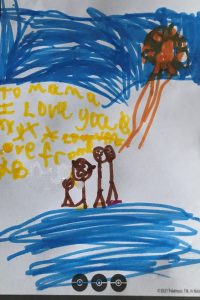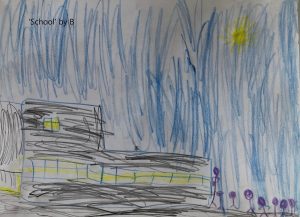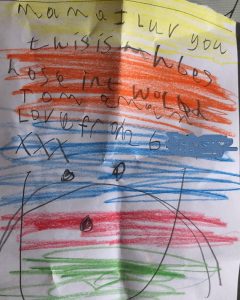I have recently signed up for the Accreditation Module of the NVR training. When I read about the case study element, I wondered which area to focus on, but ultimately settled on my use of the NVR approach in communication with my child’s school. So, in effect, I am my own case study if you like.
communication with my child’s school. So, in effect, I am my own case study if you like.
When my eldest son started nursery, his difficulties weren’t obvious. He was only three, recently placed with us and still in the ‘honeymoon’ phase where he was actively people pleasing, though we didn’t recognise this as such at the time. Nursery went smoothly, he was able to keep up with educational and social aspects of school life and all was well. Reception went similarly, though we started suspecting he had more difficulties than we initially thought. We asked for help from the adoption agency and were allocated a therapist and post adoption social worker, who are both still very much part of our support network around him, three years on. As we started highlighting struggles for him, such as being able to read social cues, his lengthy monologues about special interests, his processing speed and memory. This and other traits all led our therapist to think he may have Foetal Alcohol Spectrum Disorder (FASD). After our initial shock, we started reading and recognised traits in both of our children (his younger sister was also placed with us at the same time, at nearly 2 years old).
We shared this information with school, and his reception teacher was happy reading the materials we offered her on FASD and developmental trauma. We had a brilliant communication with her, always responded in a timely manner and we felt our parental presence at school being very much supported by her. When he was halfway through reception, I started my NVR journey. I left the foundation level course with so many ideas and thoughts and shared some of these with school – such as the message of concern we started using when our eldest had been violent at home.
Reception came to an end and year 1 started. We tried to keep up the same level of communication and information sharing but we found his new teacher not to be as receptive to this. She had accepted the DVD we offered (which we were in two minds about, we are happy educating others on themes such as FASD and developmental trauma but also don’t want to come across as ‘That Parent Who Knows It All Better’). We felt we had a good relationship with school which felt essential to our mission to give our son the best start of his school life, but his new teacher wasn’t as responsive to messages. We persisted, sending her messages regularly with updates she may find helpful, asking her questions, but we had little response. We were also still in contact with his previous teacher, now our youngest’s teacher, and managed to relay some information through her. We raised the issue with the head teacher, who advised us to liaise with the head of key stage 1, another teacher who we had never met. At this point we felt frustrated and disheartened, and we had to draw a line in the sand.
We wrote an announcement which I read out during a meeting with school, outlining the positives, what needed to change, and our hopes for the future. The response to this was positive, and we felt relieved. Communication improved and we felt our presence raised at school.

School
Not long after this, our son came home looking sad and said he didn’t want to go to school. He explained to us that he felt bullied by some other kids in the playground and told us about ‘catching’ games which felt very real for him. He spent nights awake thinking of strategies to escape the playground. Usually, my partner drops the children off at school, but on a few drop-offs and pick-ups we both went into school to speak to his teacher, to show our son we were 100% behind him and would not tolerate any unkind behaviour towards him. When he came home with bruises on his back as another child had thrown a milk crate at him, we formulated a second (brief) announcement to the teacher. There was no response to this announcement. I felt disheartened, as bullying is a subject close to my heart – I was bullied myself for years during primary and secondary school and it remains a triggering subject for me. We persisted in our communication with school and were mindful to be responding rather than reacting. We pressed the pause button on more occasions than I care to remember…
Not long after, we noticed that he was accusing his little sister of similar behaviours. When seeing both children playing together, we could see these accusations were inconsistent with our observations and a lot of his difficulties were how he reads situations, combined with a hypersensitive touch input. We fed this back to school, as we wanted to remain transparent with them and we were ok to acknowledge that perhaps it was due to our son’s traumatic past and his interpretations that issues were perceived by him as they were. He also tends to process events slower than the average 6-year-old, and he struggles to perceive people as ‘good and not so good’ in one person but tends to split between ‘good people’ and ‘bad people’. We tried to keep an open communication with the teachers and noticed that their feedback to how his school day had been, was very different to what he told us.
We communicated this to school, and we managed to set up a meeting between ourselves, school, and our therapist. Our son was present too, so he could see open communication between everyone involved in his day-to-day life. Shortly after this meeting we also introduced the home-school book, which our son was responsible for so he could see the grown ups around him communicate consistently.
He has now finished year 1 and is due to start in year 2 after the summer holidays. We are now in the process of making profiles of both kids to be shared with school, so his new teacher is aware of some of his difficulties before they start presenting at school and she will know what responses can be helpful for him and us.
Within my work context as a professional, I sometimes get asked whether I use NVR as well. I am always happy to share I use it with my own two children, their school and to be fair in most of my interactions with others. I find it takes the pressure of me of having to know the right response in the moment (when my thinking brain isn’t quite able to formulate that right response, never mind me being able to act on this), which allows me to regulate (and co-regulate where needed). It is my go-to approach with my children, family and in my professional life as well.
Anne-Lies Allemeersch, CAMHS Practitioner
NVR Practitioner & Accreditation Module Participant (2022)
